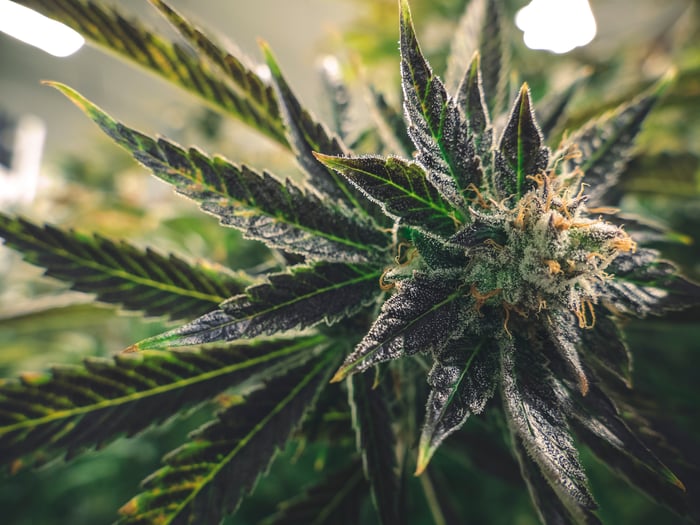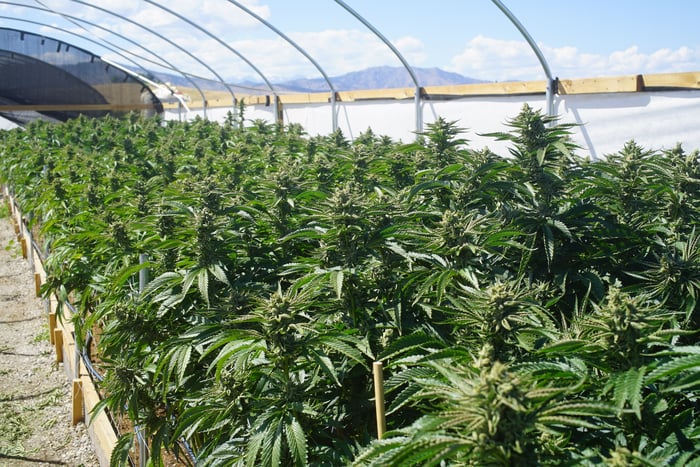Few industries are growing like legal cannabis. The duo of Arcview Market Research and BDS Analytics is forecasting 38% global sales growth in 2019, to $16.9 billion, and investment bank Cowen Group is projecting annual sales of as much as $75 billion by 2030. These revenue dollars have to wind up somewhere; the big question is, "Where?"
One such company that's squarely on the radar of investors is Ontario-based, hydroponic-focused grower CannTrust Holdings (CNTTQ), which just so happened to report its fourth-quarter and full-year operating results before the opening bell on Thursday, March 28. While the recreational legalization of cannabis in Canada, along with higher medical patient counts, helped push sales higher, the company swung to a loss as it ramped up operations.

Image source: Getty Images.
CannTrust Holdings Q4 results: The raw numbers
| Metric | Q4 2018 | Q4 2017 | Percentage Change |
|---|---|---|---|
| Net sales | CA$16.17 million | CA$6.98 million | 132% |
| Net income | (CA$25.52 million) | CA$6.25 million | N/A |
| Earnings per share | (CA$0.26) | CA$0.08 | N/A |
Data source: CannTrust Holdings. All data expressed in Canadian dollars.
There's no mistaking that the legalization of recreational marijuana and the ongoing expansion of Canada's medical cannabis system aided CannTrust in the fourth quarter. Sales surged 132% year over year, to 16.2 million Canadian dollars, with the company selling about 4.5 times as much cannabis (3,407 kilos) as it did in the year-ago quarter.
The company's active patient count also rose by 57%, to 58,000. This is important since medical marijuana patients are more likely to use pot regularly and are more willing to open their wallets to make purchases, according to the National Cannabis Survey from Canada in the fourth quarter.
On the other hand, operating expenses rose significantly, swinging the company to a fourth-quarter net loss of CA$25.5 million, or CA$0.26 per share, compared to a year-ago per-share profit that was aided by fair-value adjustments to biological assets (i.e., cannabis plants). The company specifically cited increased marketing costs to support the launch of its four recreational weed brands, the hiring of workers focused on product innovation, and the company's international strategy, as reasons for its higher operating expenses.
Check out the latest earnings call transcripts for the companies we cover.

Image source: Getty Images.
What happened with CannTrust Holdings this quarter?
During and subsequent to the fourth quarter, CannTrust was primarily focused on boosting its production capacity to become a major player in Canada. Here's a rundown of some of the biggest developments:
- The company closed on a 19.4 acre property of land adjacent to its Niagara greenhouse in the town of Pelham. Niagara currently has 450,000 square feet of completed greenhouse for hydroponic growing. Following months of discussion, CannTrust received all of the necessary permits to move forward with the construction of a 390,000 square foot facility (its phase 3 expansion) in January. It's believed that this phase 3 expansion will increase annual peak output to 100,000 kilos on an annualized run-rate basis by as soon as the second half of 2020.
- CannTrust entered into a letter of intent to acquire 200 acres of land that it will use for outdoor harvesting. The closing of this land purchase is expected during the second quarter of 2019, with the added production doubling or tripling peak annual capacity to between 200,000 kilos to 300,000 kilos.
- The company uplisted from the over-the-counter exchange to the New York Stock Exchange (NYSE), changing its ticker symbol to CTST from CNTTF in the process. Listing on the NYSE will provide CannTrust with improved visibility and volume-based liquidity.

Image source: Getty Images.
What management had to say
CannTrust's CEO Peter Aceto was notably optimistic about his company's long-term prospects. Here's a brief rundown of what Aceto had to say with regard to CannTrust's capacity expansion and product development:
We expect the trajectory of revenue growth to continue in 2019 as we bring additional capacity online through our Phase 2 expansion [of Niagara], realize the potential of investments we have made into training and crop yield optimization, implement targeted price increases and distribute our products to more and more consumers. Additionally, CannTrust expects to take bold action to achieve leadership in growing cannabis outdoors. We have entered into Letters of Intent to secure approximately 200 acres of land, which we estimate will add an additional 100,000kg to 200,000kg of production in 2020, subject to regulatory approvals. In combination with our Phase 3 expansion, we estimate our annual production capacity target to be between 200,000kg and 300,000kg. We also plan to become an early mover in vaporization products and develop further partnerships to bring innovative products to market.
More specific to Aceto's final point, the press release makes note of the company working on vape pens, confectionaries, and beverages, all of which should become legal for sale by this coming fall, according to an outline released by Health Canada.

Image source: Getty Images.
Looking forward
Looking ahead, CannTrust remains focused on capacity expansion, product innovation, and a return to profitability.
As noted, the company's acquisition of 200 acres of land should be complete by sometime during the second quarter. This will allow the company to leverage its genetics and low-cost growing techniques to double or triple its peak annual production, vaulting the company into Canada's top five growers by peak output.
CannTrust's focus on alternative cannabis products will also be key to its success and return to profitability. Although dried flower is the face of the cannabis movement, it's shown a tendency to be commoditized in recreationally legal U.S. states. The company's push for innovative consumption options are expected to pay off with higher margins.
Lastly, with regard to its operating results, CannTrust anticipates that first-quarter EBITDA (earnings before interest, taxes, depreciation, and amortization) will be consistent with what it reported in the fourth quarter (an adjusted EBITDA loss of CA$8.5 million). However, profitability should improve as operational activity at the company's phase 2 Niagara expansion is brought online. CannTrust is targeting a return to profitability once it gains "positive operating leverage" from its phase 2 expansion.
The ride may be a bit bumpy now, but management portends "green" pastures ahead.





